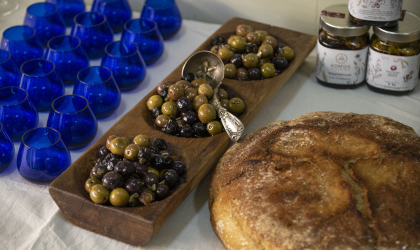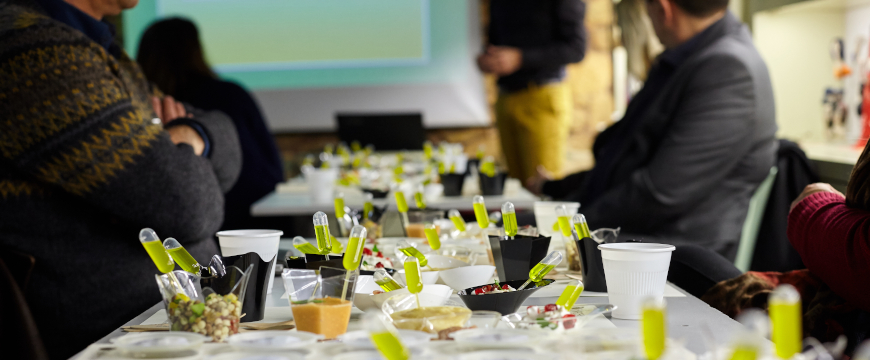By the sea near the northeastern edge of Greece, the Michelis-Adamidis family has been growing local Makri variety olives since 1935. Developing their olive estate for generations, they began to introduce notable innovations decades ago. Today their award-winning Konos olive oil and table olives draw tourists to unique agrotourism and food pairing events.
For nearly a century, the family behind Konos olive oil has been dedicated to promoting the character of the local Makri olive variety, which makes up 90 to 95% of the olives in their area and yields an olive oil with a delicate fruitiness, as well as tasty table olives. Focused on high quality, Konos sells only olives and olive oil originating in their own groves, which are located on scenic Konos Hill, between the mountain and the sea.
To achieve the best possible quality—even if that means a smaller quantity--the Konos team harvests their olives in the cool morning hours, starting at the beginning of October while the olives are still green, and scrupulously managing the milling process in their own modern two-phase olive mill. There, right in the groves, oil production starts within a few hours of the harvest, at especially low temperatures (below 22 degrees Celsius). Rather than filtering their oil, Konos lets it settle naturally. Even that unfiltered early harvest extra virgin olive oil (EVOO) maintains its quality for more than a year, as lab tests indicate.
In addition to their 100% monovarietal PDO Makri EVOO, Konos Olive Hill produces an innovative blend made from Makri olives and the typically Spanish Picual variety olives they also grow. This is called “Filoso” (“Sharp” in Spanish) because of the pungency, bitterness, and spiciness of this higher-phenolic olive oil. For their premium EVOO, they blend the oils from Makri olives of different levels of ripeness. Konos olive oil and olives are exported to other European countries and overseas, as well as being sold to restaurants and delicatessens in Greece.
Innovation over the Decades
Among the first producers in the area around Alexandroupoli to cultivate olives as their main source of income, the Michelis-Adamidis family has been a pioneer in the Greek olive oil sector for generations. As president of the Makri Agricultural Partnership for many years, beginning in the early ‘80s, Dimitris Adamidis’s grandfather, Dimitrios Michelis, used one of the earliest drip irrigation systems in the region. On top of that, he helped introduce the use of plastic lugs (baskets) for collecting olives in their area in the 1990s. (Many olive farmers still use bags, but the baskets allow more air circulation and less premature crushing, which yields better products.)
More recently, the Konos Olive Hill team initiated the packaging of Makri table olives in their area. They were the first to make “patites,” pressed Makri olives. These award-winning olives are salted, then pressed under a heavy weight until they are semi-dried and uniquely flavorful, full of the freshness of the fruit. Konos also offers dried mature table olives, naturally fermented brined olives, and a worldwide innovation of Byzantine-style olives.

The Ethnological Museum of Thrace helped with this unique new olive product by providing a recipe from the time of the Byzantine Empire. Adamidis adapted the recipe so the olives could be packaged in a jar. “We created a unique gastronomic product with a deep, complex flavor,” Adamidis reports: “the base of the liquid is grape molasses and red wine vinegar, plus brine, dried herbs, olive oil, and Makri olives with three different fermentations – more than 10 ingredients.”
Konos is also the only Greek olive company to engage in a nocturnal harvest. Starting in 2019, their crew has harvested olives below the full moon of October. In addition to producing a rare limited edition extra virgin olive oil, they are making a point about climate change. As Adamidis explains, “we have to do it at night, because in the morning the temperatures now are really high in our area. In the past, it was so cold, but in the last seven years the climate has changed rapidly. This is an effort to talk about climate change, which is a real issue.”
Furthermore, the cool nocturnal harvest is good for the olives and the oil. Adamidis tells us why: “The olives don’t get damaged by the sunlight or the temperature.” Moreover, they take the olives to the mill every half hour, “so the damage is zero -- that’s our goal.” The result of this night-time early harvest: especially high fruitiness, spiciness, bitterness, and healthy polyphenols.
Agrotourism and Gastronomic Tourism
Last year, the Konos family began inviting visitors to participate in their unusual nocturnal harvest, as they will in the future. In fact, from spring through early autumn, this family business often welcomes tourists from various countries for agrotourism and gastronomic events. Adamidis and his team lead a tour of their olive groves, describe their sustainable cultivation process and their harvesting procedure, explain how they produce olive oil in their mill, and conclude with an olive oil tasting and food pairing experience.
One of Konos’s main goals was always to emphasize food pairing. Working with the olive oil gastronomy promoters of Oliverse, Panagiotis Papanikolopoulos (aka Gastronaftis) and Kostas Tsoronis, Adamidis says, “we were one of the first in Greece to put food pairings on the bottles’ labels so people can use the olive oil the right way,” with the specific characteristics of each product matched with the foods it can enhance most effectively. Now, for food pairing events for groups, Adamidis, his brother, and their partner prepare multi-course meals featuring both traditional and modern gastronomic creations that highlight their own olives and olive oil, as well as other local products of Evros and Thrace.
Thanks to Konos for the photos that appear with this article.
Due to destruction from the tragic fires in Makri and Alexandroupoli in August 2023, Konos will temporarily suspend operation.
All businesses, organizations, and competitions involved with Greek olive oil, the Mediterranean diet, and/or agrotourism or food tourism in Greece, as well as others interested in supporting Greeks working in these sectors, are invited to consider the advertising and sponsorship opportunities on the Greek Liquid Gold: Authentic Extra Virgin Olive Oil website. The only wide-ranging English-language site focused on news and information from the Greek olive oil world, it has helped companies reach consumers in more than 220 countries around the globe.


